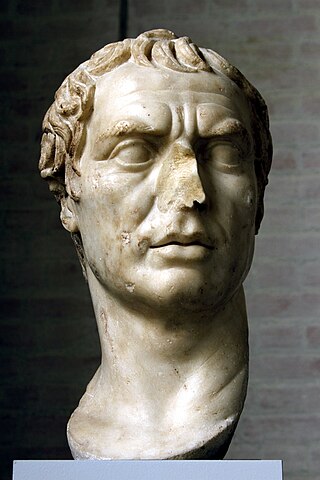Related Research Articles
This article concerns the period 219 BC – 210 BC.
Year 211 BC was a year of the pre-Julian Roman calendar. At the time it was known as the Year of the Consulship of Maximus and Maximus. The denomination 211 BC for this year has been used since the early medieval period, when the Anno Domini calendar era became the prevalent method in Europe for naming years.
Year 212 BC was a year of the pre-Julian Roman calendar. At the time it was known as the Year of the Consulship of Flaccus and Pulcher. The denomination 212 BC for this year has been used since the early medieval period, when the Anno Domini calendar era became the prevalent method in Europe for naming years.
Gnaeus Cornelius Scipio Calvus was a Roman general and statesman during the third century BC. He played a major part in the Second Punic War, establishing Roman rule in the east of the Iberian peninsula and tying up several Carthaginian armies to keep them from reinforcing Hannibal.

Publius Cornelius Scipio Nasica was a consul of ancient Rome in 191 BC. He was a son of Gnaeus Cornelius Scipio Calvus.

The gens Licinia was a celebrated plebeian family at ancient Rome, which appears from the earliest days of the Republic until imperial times, and which eventually obtained the imperial dignity. The first of the gens to obtain the consulship was Gaius Licinius Calvus Stolo, who, as tribune of the plebs from 376 to 367 BC, prevented the election of any of the annual magistrates, until the patricians acquiesced to the passage of the lex Licinia Sextia, or Licinian Rogations. This law, named for Licinius and his colleague, Lucius Sextius, opened the consulship for the first time to the plebeians. Licinius himself was subsequently elected consul in 364 and 361 BC, and from this time, the Licinii became one of the most illustrious gentes in the Republic.
Gnaeus, also spelled Cnaeus, was a Roman praenomen derived from the Latin naevus, a birthmark. It was a common name borne by many individuals throughout Roman history, including:

The gens Cornelia was one of the greatest patrician houses at ancient Rome. For more than seven hundred years, from the early decades of the Republic to the third century AD, the Cornelii produced more eminent statesmen and generals than any other gens. At least seventy-five consuls under the Republic were members of this family, beginning with Servius Cornelius Maluginensis in 485 BC. Together with the Aemilii, Claudii, Fabii, Manlii, and Valerii, the Cornelii were almost certainly numbered among the gentes maiores, the most important and powerful families of Rome, who for centuries dominated the Republican magistracies. All of the major branches of the Cornelian gens were patrician, but there were also plebeian Cornelii, at least some of whom were descended from freedmen.
Publius Aelius Paetus was a Roman consul of the late 3rd century BC. He was a prominent supporter of Scipio Africanus, and was elected censor with Africanus in 199.
Gnaeus Domitius Ahenobarbus was a consul of Rome in 192 BC.
Marcus Pupius Piso Frugi Calpurnianus was a Roman senator. Originally a member of the gens Calpurnia, which claimed descent from Numa Pompilius, the second king of Rome, a Calpurnius Piso Frugi, he was adopted by Marcus Pupius, when the latter was an old man. He retained, however, his family-name Piso.
Lucius Cornelius Scipio was a statesman of the Roman Republic. He was the second son of Scipio Africanus, but despite this illustrious background, his career was cut short by his demotion from the senate by the censors in 174 BC.

Quintus Caecilius Metellus Pius Scipio, often referred to as Metellus Scipio, was a Roman senator and military commander. During the civil war between Julius Caesar and the senatorial faction led by Pompey, he was a staunch supporter of the latter. He led troops against Caesar's forces, mainly in the battles of Pharsalus and Thapsus, where he was defeated. He later committed suicide. Ronald Syme called him "the last Scipio of any consequence in Roman history."
Gnaeus Cornelius Scipio Hispanus of the Scipiones branch of the gens Cornelia, was a Roman politician.
Lucius Valerius Flaccus was a Roman politician and general. He was consul in 195 BC and censor in 183 BC, serving both times with his friend Cato the Elder, whom he brought to the notice of the Roman political elite.

Publius Cornelius Scipio Africanus was a Roman general and statesman, most notable as one of the main architects of Rome's victory against Carthage in the Second Punic War. Often regarded as one of the greatest military commanders and strategists of all time, his greatest military achievement was the defeat of Hannibal at the Battle of Zama in 202 BC. This victory in Africa earned him the honorific epithet Africanus, literally meaning "the African", but meant to be understood as a conqueror of Africa.
Quintus Petillius Spurinus was a Roman politician in the second century BC.